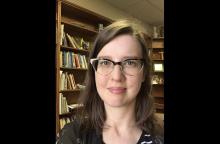Working for a more peaceful world can take place anywhere. For Susanne Guenther Loewen it takes place at the front of the classroom at Saskatchewan’s largest public university. Guenther Loewen is in her third year of teaching Introduction to Peace Studies at Saint Thomas More College on the University of Saskatchewan campus in Saskatoon.
She also serves as co-pastor of Nutana Park Mennonite Church in Saskatoon.
Students from any program can enroll in her Peace Studies course as an elective. Students from a range of programs enroll in the course, including pre-law, social work, political studies and kinesiology. There is often a waiting list to enroll.
Guenther Loewen finds hope in the fact that so many students are interested in the course. “I think there’s something about being that age, when you feel like change is possible in the world, and you want to make a difference. I think young people are optimistic about their future and the future of the world, and many of them are choosing their majors in that way too,” she says.
Guenther Loewen’s interest in the academic discipline of Peace Studies is rooted in her Mennonite identity. In the opening lecture of the course, she talks about being part of the Mennonite church as well as the long tradition of pacifism and non-violence within it. Her own family history includes conscientious objectors.
She earned a PhD in Peace Theology from the Toronto School of Theology. Her own academic specialty is Christian, Mennonite, Feminist perspectives on peace.
The course she teaches provides a broad survey of peace movements, issues and theories, including reconciliation with Indigenous people, non-violent resistance and restorative justice.
Her aim is for the course to have a strong emphasis on the practical skills of peacemaking. She often invites guest lecturers from Mennonite peacebuilding organizations such as Mennonite Central Committee or Parkland Restorative Justice.
“As a Mennonite, I already have all these built-in connections to peace-building organizations,” she says, laughing.
One of the first exercises the class does together is to workshop the university’s land acknowledgement statement. Students are invited to make changes and additions to the statement. Once it’s completed, that acknowledgement is used to open each class for the rest of the semester. Guenther Loewen describes it as a fascinating exercise. Students often add in the names of the specific First Nations in Treaty 6 and use more explicit language to describe the harms done.
This term, students amended the statement to make clear that this acknowledgement is just one step toward reconciliation, rather than the primary way reconciliation is practiced.
Students report to her how eye-opening the course has been for them. “I’ve received comments like ‘I didn’t realize peace was so complex,’” she says. “I think some students come in thinking of peace as this utopia, where everyone gets along. Restorative Justice is always a big one for my students; it’s quite mind-boggling for some of them to find out there’s another way to approach justice.” These moments feel especially gratifying for her as she considers the number of pre-law students enrolled in the course.
Members of the international and Indigenous community are often in the course, and she aims to create space for those students to share their unique perspectives. Once, a Palestinian student was able to share their “powerful story" of displacement and eventual immigration to Canada.
Ultimately, Guenther Loewen seeks to remind students that peace work can and needs to happen at all levels: peace with self, family, community and the global community. “I try to impart to students that peace is accessible to anyone,” she says. “Even my young kids can contribute. For peace to last and be sustainable, it has to be at all levels. When we think of peace, we often think big stuff, you know, like governments, like that’s where peace really happens. Really, it’s much more disseminated across society; there’s something we can do at all levels.”




Add new comment
Canadian Mennonite invites comments and encourages constructive discussion about our content. Actual full names (first and last) are required. Comments are moderated and may be edited. They will not appear online until approved and will be posted during business hours. Some comments may be reproduced in print.